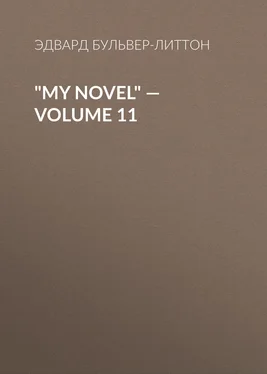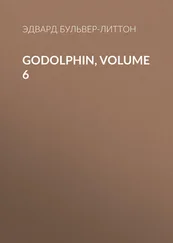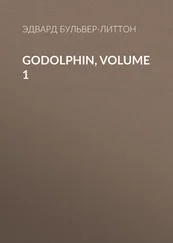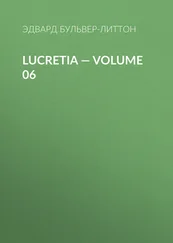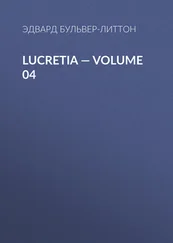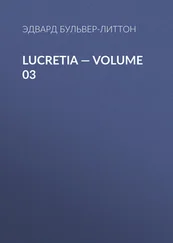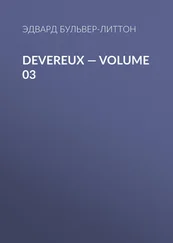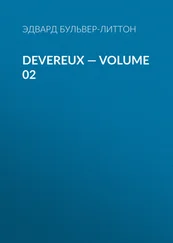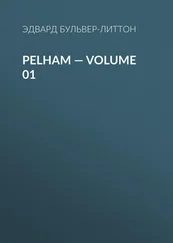Эдвард Бульвер-Литтон - My Novel — Volume 11
Здесь есть возможность читать онлайн «Эдвард Бульвер-Литтон - My Novel — Volume 11» — ознакомительный отрывок электронной книги совершенно бесплатно, а после прочтения отрывка купить полную версию. В некоторых случаях можно слушать аудио, скачать через торрент в формате fb2 и присутствует краткое содержание. Жанр: foreign_prose, literature_19, Европейская старинная литература, foreign_antique, на английском языке. Описание произведения, (предисловие) а так же отзывы посетителей доступны на портале библиотеки ЛибКат.
- Название:My Novel — Volume 11
- Автор:
- Жанр:
- Год:неизвестен
- ISBN:нет данных
- Рейтинг книги:3 / 5. Голосов: 1
-
Избранное:Добавить в избранное
- Отзывы:
-
Ваша оценка:
- 60
- 1
- 2
- 3
- 4
- 5
My Novel — Volume 11: краткое содержание, описание и аннотация
Предлагаем к чтению аннотацию, описание, краткое содержание или предисловие (зависит от того, что написал сам автор книги «My Novel — Volume 11»). Если вы не нашли необходимую информацию о книге — напишите в комментариях, мы постараемся отыскать её.
My Novel — Volume 11 — читать онлайн ознакомительный отрывок
Ниже представлен текст книги, разбитый по страницам. Система сохранения места последней прочитанной страницы, позволяет с удобством читать онлайн бесплатно книгу «My Novel — Volume 11», без необходимости каждый раз заново искать на чём Вы остановились. Поставьте закладку, и сможете в любой момент перейти на страницу, на которой закончили чтение.
Интервал:
Закладка:
PARSON.—"Mr. Fairfield has kindly called with us, because he knows something of this system of homeeopathy which you have adopted, and may, perhaps, know the practitioner. What is the name of your doctor?"
CAPTAIN (looking at his watch).—"That reminds me" (swallowing a globule). "A great relief these little pills—after the physic I've taken to please that malignant man. He always tried his doctor's stuff upon me. But there's another world, and a juster!"
With that pious conclusion the captain again began to weep.
"Touched," muttered the squire, with his forefinger on his forehead. "You seem to have a good—tidy sort of a nurse here, Cousin Barnabas. I hope she 's pleasant, and lively, and don't let you take on so."
"Hist!—don't talk of her. All mercenary; every bit of her fawning! Would you believe it? I give her ten shillings a week, besides all that goes down of my pats of butter and rolls, and I overheard the jade saying to the laundress that 'I could not last long; and she 'd—EXPECTATIONS!' Ah, Mr. Dale, when one thinks of the sinfulness there is in this life! But I'll not think of it. No, I'll not. Let us change the subject. You were asking my doctor's name. It is—"
Here the woman with "expectations" threw open the door, and suddenly announced "DR. MORGAN."
CHAPTER IV
The parson started, and so did Leonard.
The homoeopathist did not at first notice either. With an unobservant bow to the visitors, he went straight to the patient, and asked, "How go the symptoms?"
Therewith the captain commenced, in a tone of voice like a schoolboy reciting the catalogue of the ships in Homer. He had been evidently conning the symptoms, and learning them by heart. Nor was there a single nook or corner in his anatomical organization, so far as the captain was acquainted with that structure, but what some symptom or other was dragged therefrom, and exposed to day. The squire listened with horror to the morbific inventory, muttering at each dread interval, "Bless me! Lord bless me! What, more still! Death would be a very happy release!" Meanwhile the doctor endured the recital with exemplary patience, noting down in the leaves of his pocketbook what appeared to him the salient points in this fortress of disease to which he had laid siege, and then, drawing forth a minute paper said,
"Capital,—nothing can be better. This powder must be dissolved in eight tablespoonfuls of water; one spoonful every two hours."
"Tablespoonful?"
"Tablespoonful."
"'Nothing can be better,' did you say, sir?" repeated the squire, who in his astonishment at that assertion applied to the captain's description of his sufferings, had hitherto hung fire,—"nothing can be better?"
"For the diagnosis, sir!" replied Dr. Morgan.
"For the dogs' noses, very possibly," quoth the squire; "but for the inside of Cousin Higginbotham, I should think nothing could be worse."
"You are mistaken, sir," replied Dr. Morgan. "It is not the captain who speaks here,—it is his liver. Liver, sir, though a noble, is an imaginative organ, and indulges in the most extraordinary fictions. Seat of poetry and love and jealousy—the liver. Never believe what it says. You have no idea what a liar it is! But—ahem—ahem. Cott—I think I've seen you before, sir. Surely your name's Hazeldean?"
"William Hazeldean, at your service, Doctor. But where have you seen me?"
"On the hustings at Lansmere. You were speaking on behalf of your distinguished brother, Mr. Egerton."
"Hang it!" cried the squire: "I think it must have been my liver that spoke there! for I promised the electors that that half-brother of mine would stick by the land, and I never told a bigger lie in my life!"
Here the patient, reminded of his other visitors, and afraid he was going to be bored with the enumeration of the squire's wrongs, and probably the whole history of his duel with Captain Dashmore, turned with a languid wave of his hand, and said, "Doctor, another friend of mine, the Rev. Mr. Dale, and a gentleman who is acquainted with homoeopathy."
"Dale? What, more old friends!" cried the doctor, rising; and the parson came somewhat reluctantly from the window nook, to which he had retired. The parson and the homoeopathist shook hands.
"We have met before on a very mournful occasion," said the doctor, with feeling.
The parson held his finger to his lips, and glanced towards Leonard. The doctor stared at the lad, but he did not recognize in the person before him the gaunt, care-worn boy whom he had placed with Mr. Prickett, until Leonard smiled and spoke. And the smile and the voice sufficed.
"Cott! and it is the poy!" cried Dr. Morgan; and he actually caught hold of Leonard, and gave him an affectionate Welch hug. Indeed, his agitation at these several surprises became so great that he stopped short, drew forth a globule—"Aconite,—good against nervous shocks!" and swallowed it incontinently.
"Gad," said the squire, rather astonished, "'t is the first doctor I ever saw swallow his own medicine! There must be sornething in it."
The captain now, highly disgusted that so much attention was withdrawn from his own case, asked in a querulous voice, "And as to diet? What shall I have for dinner?"
"A friend!" said the doctor, wiping his eyes.
"Zounds!" cried the squire, retreating, "do you mean to say, that the British laws (to be sure they are very much changed of late) allow you to diet your patients upon their fellow-men? Why, Parson, this is worse than the donkey sausages."
"Sir," said Dr. Morgan, gravely, "I mean to say, that it matters little what we eat in comparison with care as to whom we eat with. It is better to exceed a little with a friend than to observe the strictest regimen, and eat alone. Talk and laughter help the digestion, and are indispensable in affections of the liver. I have no doubt, sir, that it was my patient's agreeable society that tended to restore to health his dyspeptic relative, Mr. Sharpe Currie."
The captain groaned aloud.
"And, therefore, if one of you gentlemen will stay and dine with Mr. Higginbotham, it will greatly assist the effects of his medicine."
The captain turned an imploring eye, first towards his cousin, then towards the parson.
"I 'm engaged to dine with my son—very sorry," said the squire. "But Dale, here—"
"If he will be so kind," put in the captain, "we might cheer the evening with a game at whist,—double dummy." Now, poor Mr. Dale had set his heart on dining with an old college friend, and having no stupid, prosy double dummy, in which one cannot have the pleasure of scolding one's partner, but a regular orthodox rubber, with the pleasing prospect of scolding all the three other performers. But as his quiet life forbade him to be a hero in great things, the parson had made up his mind to be a hero in small ones. Therefore, though with rather a rueful face, he accepted the captain's invitation, and promised to return at six o'clock to dine. Meanwhile he must hurry off to the other end of the town, and excuse himself from the pre-engagement he had already formed. He now gave his card, with the address of a quiet family hotel thereon, to Leonard, and not looking quite so charmed with Dr. Morgan as he was before that unwelcome prescription, he took his leave. The squire too, having to see a new churn, and execute various commissions for his Harry, went his way (not, however, till Dr. Morgan had assured him that, in a few weeks, the captain might safely remove to Hazeldean); and Leonard was about to follow, when Morgan hooked his arm in his old /protege/, and said, "But I must have some talk with you; and you have to tell me all about the little orphan girl."
Leonard could not resist the pleasure of talking about Helen; and he got into the carriage, which was waiting at the door for the homoeopathist.
Читать дальшеИнтервал:
Закладка:
Похожие книги на «My Novel — Volume 11»
Представляем Вашему вниманию похожие книги на «My Novel — Volume 11» списком для выбора. Мы отобрали схожую по названию и смыслу литературу в надежде предоставить читателям больше вариантов отыскать новые, интересные, ещё непрочитанные произведения.
Обсуждение, отзывы о книге «My Novel — Volume 11» и просто собственные мнения читателей. Оставьте ваши комментарии, напишите, что Вы думаете о произведении, его смысле или главных героях. Укажите что конкретно понравилось, а что нет, и почему Вы так считаете.
